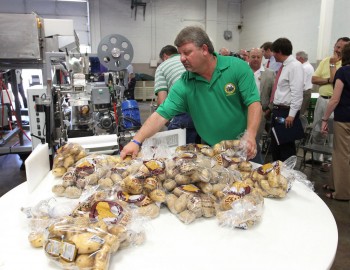
West Virginia Department of Agriculture Special Projects Coordinator Jerry Nelson distributes bags of potatoes to those attending the opening of the new WVDA Huntington Aggregation Center on Tuesday, June 28, 2016, in Huntington.
HUNTINGTON, W.Va. — In late June, West Virginia’s first crop aggregation facility officially opened in Huntington’s West End. With the election of a new state Agriculture Commissioner, the facility’s future could be short-lived.
“I plan to take a good hard look at it,” said Kent Leonhardt, the Republican agriculture commissioner-elect. “It appears to be totally government run and funded, and with the state being in a budget crisis situation, I am not sure if this program is the best use of taxpayer dollars.”
Current Agriculture Commissioner Walt Helmick called the Huntington Aggregation Center a $475,000 investment to help small farmers reach larger customer bases and to leverage existing agricultural resources as one way of diversifying West Virginia’s economy.
In addition to processing potatoes, other equipment located at the Huntington facility includes a leafy vegetables wash line, a honey extractor and a black walnut sheller. The facility will also be used for agricultural classes for both students and local farmers.
Helmick said the goal is to capture some of the approximately $6 billion that state residents spend on agricultural products produced outside of West Virginia.
“West Virginia purchases just over $7 billion in agricultural products, and we produce only about $1 billion in state,” Helmick said when the facility opened over the summer. “We don’t see this as a problem, but instead we see this is a major opportunity.”
However, Leonhardt thinks it could be a waste of taxpayer dollars.
“You can make more money on an acre of basil than you can on 50 acres of potatoes,” Leonhardt said. “Like I said, I am going to look at it and see how it is being utilized and then determine if it is a good investment for the West Virginia taxpayers.”
Leonhardt said he thinks the program would have worked better using a different model.
“It should be run by private individual farmers in a co-op situation and not be a burden on taxpayers,” he said.
He said West Virginia cannot compete with major potato growing states; instead, he wants to explore niche crops for the state.
But Leonhardt said until he takes office in January, he really can’t make any decisions.
“First, I want to make sure we are meeting the constitutional requirements of the office,” he said. “Then, I want to make sure our food safety and animal health policies and procedures are up to date.”
Proponents of the Clean Water Rule, which has also been called the Waters of the United States rule, say it was designed to allow the federal government to clarify and simplify which bodies of water can fall under protections outlined in the Clean Water Act, which was enacted in 1972.
The new rule would kick in and force a permitting process only if a business or landowner took steps to pollute or destroy covered waters. The rule is estimated to affect the drinking water of 117 million Americans.
Opponents, like Leonhardt, call the rule another example of the federal government’s overreach.
“There are good regulations and then there is federal overreach, which appears is the case with the Clean Water Act,” he said.
Fred Pace is the business reporter for The Herald-Dispatch. Follow him on Twitter @FredPaceHD.






